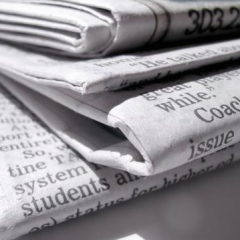MEDIAMASH: CNN, NBC Phone Home; NYT's "The Daily" Pod; The Promise of Polgreen; Partly Cloudy in Tronckadelphia and the Oxymoronic Facebook Journalism Project
MEDIAMASH is Newsonomics’ new, occasional, quick take on the media business.
Could Two Phone Companies Own (TV) News? In addition to all its other delights, the Trump era looks like it will lay down a broad red carpet for more BIG, more corporate consolidation. We already knew that the AT&T’s plan to buy Time Warner – and with its CNN, HBO’s often-provocative programming, and TBS’s Samantha Bee, among other topical news and information – might now go down easier, given the relaxing DOJ/FTC standards. Now, word increases that AT&T arch-competitor Verizon may want to snap up Comcast, with its vast, and sometimes feisty, NBC news operation. (That’s if it doesn’t instead try to gulp the big apple of recently expanded Charter Communications, opting for more infrastructure – “densification” – over content.)
How much might our press-hating new President like to neutralize CNN and NBC? Eight days before the Inauguration, Trump met with AT&T CEO Randall Stephenson. Reporters yelled questions to the execs exiting Trump Tower to no avail, a great sign of things to come for a chief executive that could head CNN. Later, the company said Trump and Stephenson shot the shit about a lot of things, but not the merger. Of course. Why mention the obvious? In fact, among gentlemen, what is often left unsaid is more powerful than what is said. Power chills. Absolute power chills absolutely.
So Verizon takes over NBC and AT&T CNN? While there may be numerous financial, and maybe regulatory hurdles, that’s another ominous sign of the eroding thin black line between press and power.
Somewhere, Paul Harvey is smiling. The New York Times just unveiled reporter’s new gig as he moves full time into the pod world. Barbaro’s “The Run-Up” caught up with the election hysteria, debuting in August, and, the Times tells me today, getting an impressive nine million downloads in five month.
The Daily – get it – debuts Wednesday. And in an old-is-new digital file, it’s a quick Times-like briefing on the day’s news. It’s meant for the fast commute, two to four “culturally relevant” pieces in 15-20 minutes. Expect to see if pushed bigly on the Times app and web.
The Times, like the smarter news media of the day, have finally learned a little secret. People haven’t changed all that much. They just have new devices plugged into their heads. They want the day’s news, briefs (consider the newsletter boom) and to know what’s important. The daily newspaper did that and now on-demand audio, aka podcasting, delivers what that legend from another era did for decades. Broadcaster Paul Harvey’s sonorous voice and “page one” shtick habituated as many as People of a certain age will remember Paul Harvey, the legendary ABC radio “newsman” captivated a generation for decades, reaching as many as 30 million people a week in smaller America, through 1200 stations, over a 55-year-career. Forty years, later, podcasting aims to do the same.
The gravy’s the same, too. ABC got dollar top dollar from Buick and Bose for Harvey placements. BMW is the Times’ launch sponsor, and my podcast reporting tells me it should be fetching print-like rates of $75 or more per thousand listeners. That’s one reason the Times’ full-time podcast staff, including contractors, has grownglobal to seven.
It’s the connection stupid. What is American journalism? What are American values? We trip ourselves up on those weighty topics, and we can see that stumbling in the coverage of the botched immigration crackdown. So, it was refreshing to see new Huffington Post editor-in-chief Lydia Polgreen, on Brian Stelter’s CNN Reliable Sources panel Sunday. A fresh voice, and mind, for our troubled times. She smartly connected almost all Americans’ own immigrant stories with the news of the day, tipping the conversation into that basic question of what are American values [Newsonomics: Doubling down on core values].
Huff, editorial architect of the New York Times’ now-$50 million funded global strategy, much sought as she rose through the Times’ editing ranks, takes on quite the opportunity. HuffPost has seemed back on its heels, struggling to find its place as the Times, Post and CNN all revved up in legacy sector and Vox, Buzzfeed, Vice and Business Insider newly lit up the start-up business. Let’s remember that HuffPost was born as The Opposition, the term Trump now freely casts the entire press as. Its founding idea: take on George W. Bush, and prep a way forward toward the 2008 election. Into this new alternative universe, Polgreen must articulate a new identity for a highly trafficked, but struggling-to-find-its-new-place, 12-year-old news organization.
The Facebook Journalism Project: I know, sounds like an oxymoron out of the box, doesn’t it? Almost lost in the roar of fakenewsery, the social empire struck back with a public relations project, some time after it had publicly proved it had no clue what it meant to pretend to be a news company. Facebook said the right thing about helping news companies, and even emphasized its concern to do something about the widening desert of local news. Yet, the plan, even at its launch seems humorously Silicon Valley self-referential: Hey, did we remind you that you can join Instant Articles and Facebook Live? We’ve got tools! We’ve got audience!!
One top news exec, who has seen the many Google partner forays and feints over the years, gave me this to-the-point analysis of why no one should expect much from this new initiative. “What makes me pessimistic is that the business model of Facebook and publishers are fundamentally mis-aligned. Facebook makes its profits by holding users in its ecosystem. Publishers make theirs best in their own environments. So getting to a mutually beneficial place is going to take some significant compromise.”
So, for now, count this as a PR stunt looking for possible traction, but remember The Duopoly. As Facebook and Google divvy up the known digital ad world between them, they both know that the supply of real-life news helps keep the turbines of commerce running. Google’s AMP initiative, for instance, has helped news companies. Consider the good stuff coming out of publisher digital ad devastation “collateral benefit.”
It’s Partly Cloudy in Tronckadelphia: Well ahead of its Feb. 22 call with financial analysts on its 2016 financial results, Tronc is out today with “new guidance.” The skinny: Tronc says it will beat its earlier earnings guidance, scoring $180.5 million compared to its previous guidance of $172-177 million. Call it the Cubs Bonus! The Chicago Tribune only waited 108 years to cash in on the North Side team. And that the four to five million in extra commemorative revenue pumped up Tronc, which I know, sounds fairly obscene, but I’m don’t think is.
Its overall revenue will hit the low end of its estimated range. And for 2017, the company promises quite a feat, another five to 15 million dollars in additional earnings, while seeing revenue drop by $10 to $40 million. That means lots of cutting. Investors have knocked the share price down about two percent so far today.
Will Tronc’s numbers further chill a new Gannett bid? They may be just good enough to do that. Gannett reports its own 2016 financials on Feb. 9.




